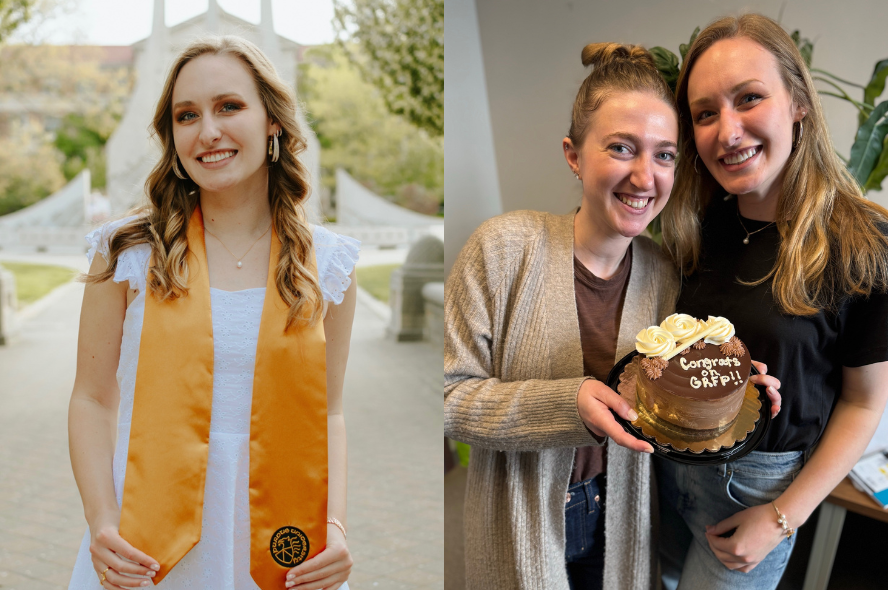Tufts PhD student named NSF Fellow

Building knowledge about common but understudied conditions like endometriosis is a major motivator for first-year PhD candidate Reagan Bushok of the Department of Biomedical Engineering. Thanks to the National Science Foundation Graduate Research Fellowship Program (NSF GRFP), she’ll be able to advance understanding of endometriosis with an eye towards potential treatment.
Endometriosis occurs when tissue mimicking the endometrial (inner) lining of the uterus grows outside the uterus. It can occur in the pelvis, ovaries, bowels, bladder, or other areas of the body. The condition brings a host of negative effects including chronic pain, irregular bleeding, and in some cases infertility. Endometriosis affects approximately one in ten women and individuals with a uterus of reproductive age. Nearly 80% of cases are classified as peritoneal endometriosis and involve the formation of lesions on the peritoneum. Despite the prevalence of this debilitating issue, there is a lack of understanding around how these lesions form and emerge.
Each year, the NSF provides support to outstanding graduate students who are working on research-based master's and doctoral degrees in NSF-supported science, technology, engineering, and mathematics disciplines. Among other projects this year, the prestigious fellowship will support Bushok’s research in women’s health, specifically in better understanding how and why lesions form in peritoneal endometriosis.
Bushok plans to investigate the biomechanics of lesion establishment. Her research will explore key questions including why some endometrial cells implant and how much influence pre-existing dysfunction or endometrial priming have on lesion formation. To explore these questions, she will create a model of the peritoneum using 3D co-culture systems with patient-derived endometrial organoids and mesothelial cells that line the thin membrane within the peritoneum. Bushok will use the model to investigate how stiffness, inflammatory signaling, and mesothelial barrier integrity affect lesion growth in the peritoneum.
The NSF funding will unlock new possibilities in her research. She will be able to invest in specialized tools and materials, such as obtaining cells derived from patients with endometriosis, that will help her to create accurate and effective models. “With this support, I can pursue more ambitious questions, explore new techniques, and really invest in building models that reflect patient biology and eventually inform new treatments,” said Bushok.
Current treatment methods, including hormone suppression therapies and surgery for endometriosis, tend to focus on managing pain rather than stopping lesions from emerging. They have high failure and recurrence rates, rendering them largely ineffective. Bushok’s exploration contributes to a better understanding of why lesions occur in the first place, which could lead to improved treatment methods that address the root cause of the issue.
Strong faculty mentorship has been a cornerstone of Bushok’s experience at Tufts. “My PI [Assistant Professor] Dr. Juan Gnecco is an incredible mentor,” she shared. “He challenges us to think critically and pushes us to be the best researchers we can be, but he also leads with a lot of empathy.” The supportive lab environment at Tufts has helped Bushok reach new heights in her research. As she notes, “the people at Tufts are what make Tufts so special!”
The Gnecco Lab for Reproductive Engineering, where Bushok conducts her research, merges tissue engineering approaches and reproductive biology to address women’s health inequities by understanding the immune-endocrine mechanisms that regulate both physiological and disease processes. Their goal is to unlock the secrets hiding in the endometrium and identify novel therapeutic targets for endometriotic diseases.
Being chosen as a member of the NSF Graduate Research Fellowship Program is both a professional achievement and a personal honor for Bushok. Moving forward she plans to continue building expertise at the intersection of engineering and reproductive biology. Speaking about the program Bushok shared, “Being selected felt like meaningful recognition, not just of my work, but of the importance of research in women’s health and endometriosis.”
Department:
Biomedical Engineering